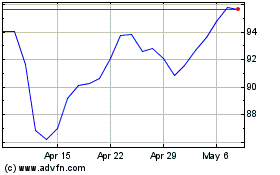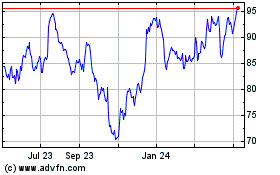Morgan Stanley's Earnings Rise on Strength in Wealth Management -- Update
October 17 2017 - 7:49AM
Dow Jones News
By Liz Hoffman
Morgan Stanley said its third-quarter profit rose 12% to $1.78
billion as its giant wealth-management business continued to churn
out reliable profits even as trading revenue declined.
The Wall Street firm reported earnings of 93 cents a share
versus analyst expectations of 81 cents a share. Revenue of $9.2
billion was up 3.2% from $8.91 billion a year ago and beat analyst
expectations of $9.02 billion.
Shares rose 1.6% premarket.
Rivals including J.P. Morgan Chase & Co. and Citigroup Inc.
last week reported profit increases powered by commercial lending
and credit cards. Morgan Stanley instead leans on its wealth
management division, which oversees $2.2 trillion for some 3.5
million American households, to steady its earnings.
The smallest of Wall Street's big six banks, Morgan Stanley is
in the late innings of a multiyear transformation under Chief
Executive James Gorman, who has steered it away from lumpy,
error-prone trading and toward steadier advisory and
asset-management businesses.
The cornerstone of that pivot was the multiyear takeover of
Citigroup's brokerage, Smith Barney. Morgan Stanley integrated
those businesses and squeezed much of the obvious savings from the
business, improving profit margins by double digits.
Now, executives are looking ahead to boost revenue. A key
initiative is pushing loans to wealth clients. Another is adding
digital offerings -- Morgan Stanley will roll out a robo adviser
for smaller account balances this fall -- without losing the
loyalty of its 15,800 human brokers.
Morgan Stanley's return on equity, a key measure of how
profitably it invests shareholders' money, stood at 9.6% in the
quarter and 9.8% through the first nine months of the year. Mr.
Gorman has targeted a minimum of 9% for the full year.
Morgan Stanley reported an 8.7% increase in wealth management
revenue, which now makes up nearly half of the firm's total. Net
income in that division rose 24% year over year, and pretax margin
was a record 26.5%.
Assets in accounts on which Morgan Stanley earns management fees
--rather than those that charge per-trade commissions--cleared $1
trillion for the first time, a record 44% percentage of the firm's
total assets. The firm has pivoted toward these fee-based accounts,
which face fewer regulations, produce steadier revenue and pose
fewer conflicts of interest than those based on commissions.
Trading revenue fell 8.2%, mirroring declines at rivals J.P.
Morgan and Citigroup. Compared with those firms, Morgan Stanley is
more heavily weighted toward hedge funds and active asset managers,
which have had a rough go lately.
Revenue from stock-trading was essentially flat at $1.89
billion. As Wall Street's leader in that business -- among large
global banks, Morgan Stanley earns about 20% of total equities fees
-- its growth prospects are slim. But guarding its turf remains a
priority for Edward Pick, the former equities chief who now
oversees all firmwide trading businesses.
Morgan Stanley's smaller fixed-income division reported $1.2
billion in revenue, down 21% from year ago but still clearing a $1
billion quarterly target set out by Mr. Gorman.
Morgan Stanley's investment bankers, who arrange mergers and
help companies raise money, reported $1.27 billion in revenue, up
15% from a year ago. Merger and underwriting fees all rose in the
double digits on a percentage basis.
Write to Liz Hoffman at liz.hoffman@wsj.com
(END) Dow Jones Newswires
October 17, 2017 07:34 ET (11:34 GMT)
Copyright (c) 2017 Dow Jones & Company, Inc.
Morgan Stanley (NYSE:MS)
Historical Stock Chart
From Mar 2024 to Apr 2024

Morgan Stanley (NYSE:MS)
Historical Stock Chart
From Apr 2023 to Apr 2024
